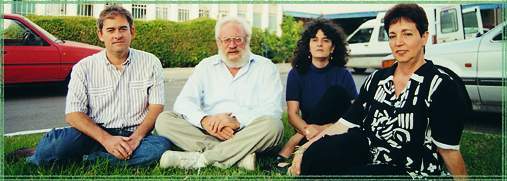Are you a journalist? Please sign up here for our press releases
Subscribe to our monthly newsletter:

"All beginnings are difficult," but that's fine by Prof. Haim Aviv. One of the success stories of Israel's biotechnology industry, Aviv cites beating the odds as one of his favorite occupations. He is currently setting up yet another company - his sixth.
Born in Romania, Aviv immigrated to Israel in 1950 at age ten. He spent his childhood in Rehovot and on a kibbutz, where his dream of studying agriculture took root. After obtaining a master's degree from the Hebrew University's Faculty of Agriculture in Rehovot, he began doctoral studies at the Weizmann Institute's Feinberg Graduate School in the laboratory of the late Prof. David Elson. "There," reminisces Aviv, "it seemed as though the secret of life was revealed to me in the form of molecular biology. I was completely won over." After completing his Ph.D. under the guidance of Profs. David Elson, Ada Zamir, and Michel Revel, Aviv pursued postdoctoral research with Prof. Phillip Leder at the U.S. National Institutes of Health. In 1973 he returned to the Weizmann Institute as a senior researcher and by the end of the 1980s had been promoted to the rank of associate professor.
It was during the early 1980s that Aviv recognized an unmined treasure: the bevy of first-rate scientists trained in various universities and research institutes, all of which lacked employment opportunities beyond pure research. The combination of that unexplored human treasure and specific needs that were already surfacing in the world market led him to the inevitable conclusion: the future lay in biotechnology. The knowledge attained in basic scientific research could be harnessed for the development and manufacture of products, especially in the field of biomedicine, in which science fiction-like scenarios could possibly be realized.
What today might seem almost self-evident was, in the early 1980s, a raw concept that few knew how to realize. But Aviv was determined to introduce molecular biology into the industrial production lines. He started out at the Weizmann Institute library, where he checked every entry related to the key words: Biology, Research, and Industry. "I was surprised to discover that extensive use was already being made of applied biological research in industry, although at the time most of it had to do with manufacturing antibiotics," said Aviv.
This discovery channeled the direction of Aviv's research at the Institute. "We began increasingly to use genetic engineering techniques. One of our main projects at the time was to isolate the gene responsible for secretion of the growth hormone in cows. The professional literature suggested that this gene might help significantly boost milk production levels." Success was not long in coming, and the Weizmann Institute's Yeda company registered a patent for isolating the gene. It was a pioneering effort in the field of applied genetic engineering. But, as is well known, scientific success does not guarantee financial prosperity. Studying the rules that govern the world "outside the ivory tower," Aviv came to understand that it would be best to establish an economic entity - a new company focused entirely on deriving maximum benefit from scientific discoveries.
Bidding farewell to a promising scientific career, Aviv established Bio-Technology General, the first Israeli biotech company based on genetic engineering. Today, after having founded five biotech companies, he stands at the helm of Pharmos, whose main aim is to develop a drug for head injuries and stroke.
The potential market for Pharmos's future drug is currently estimated at a billion dollars. But Aviv, never content to merely reap what he has sown, is already moving on to his next start-up challenge.